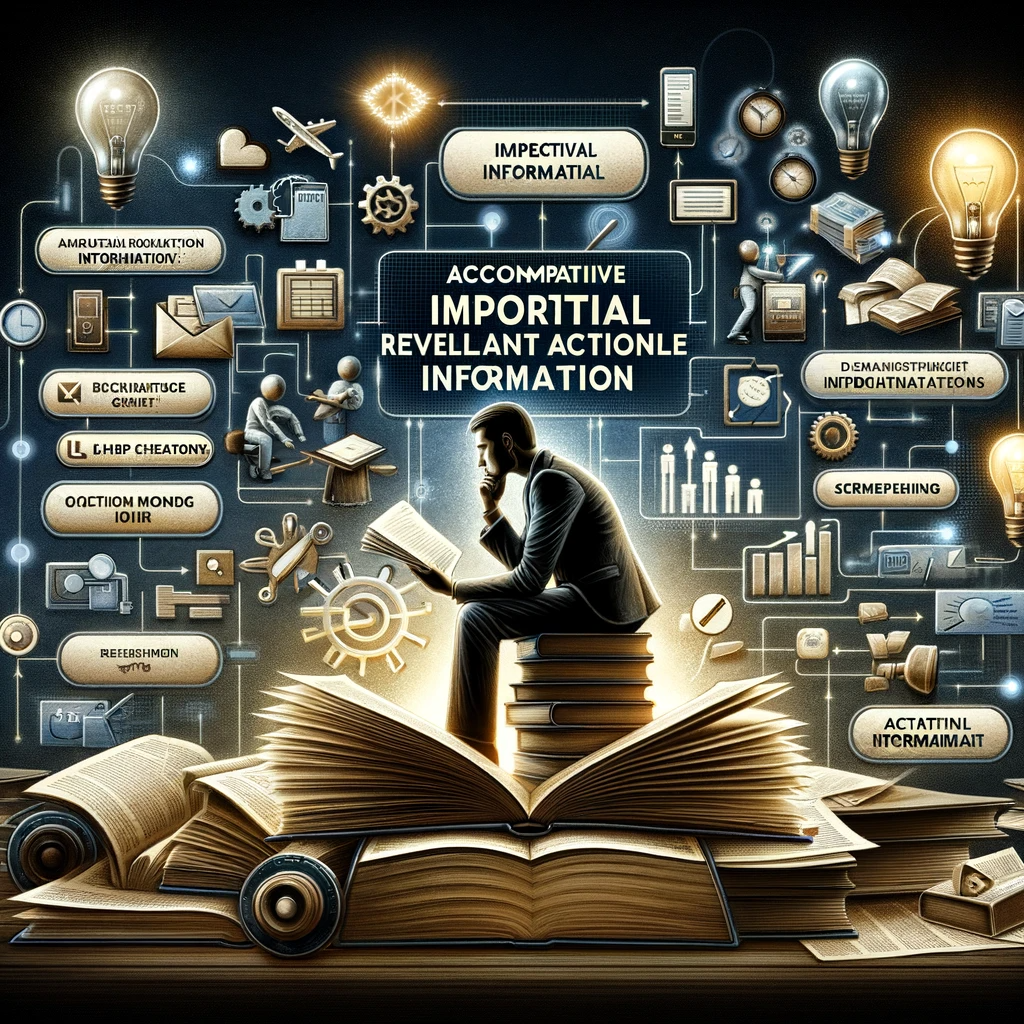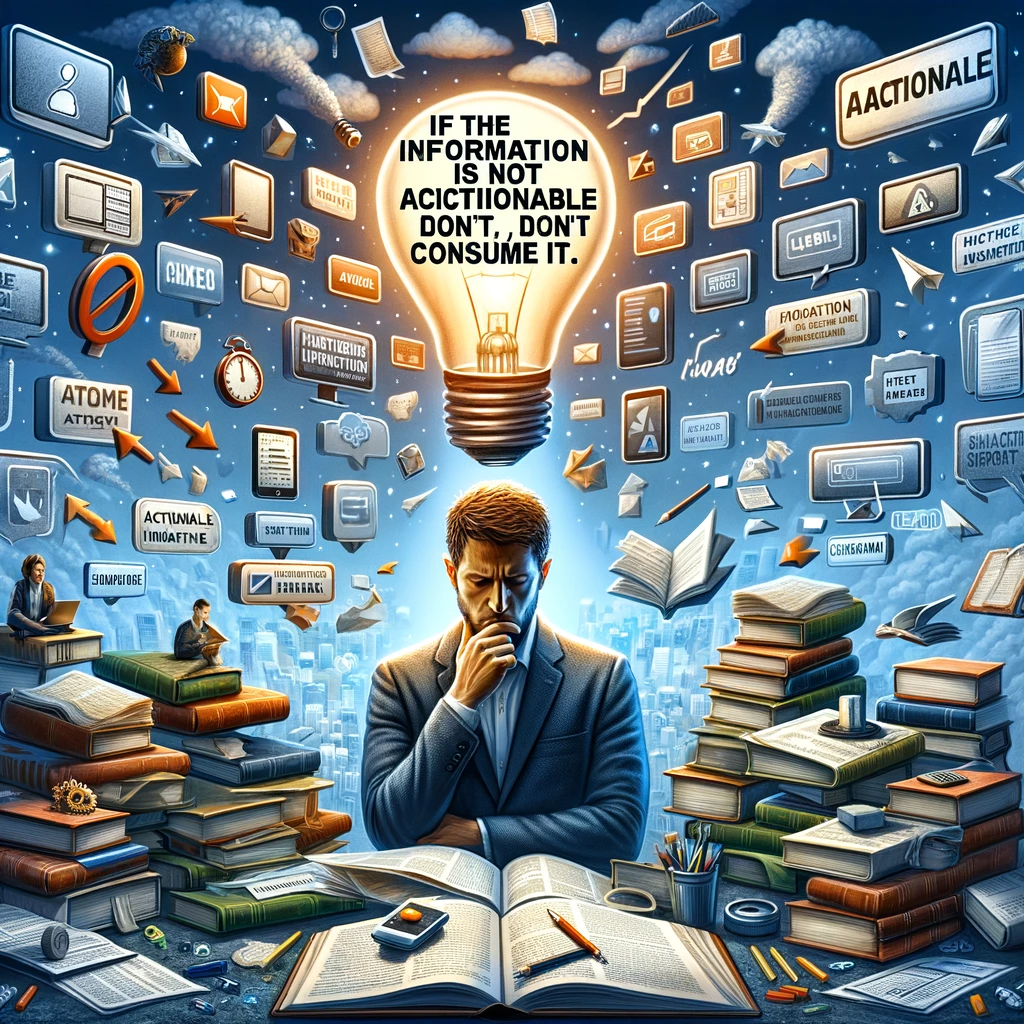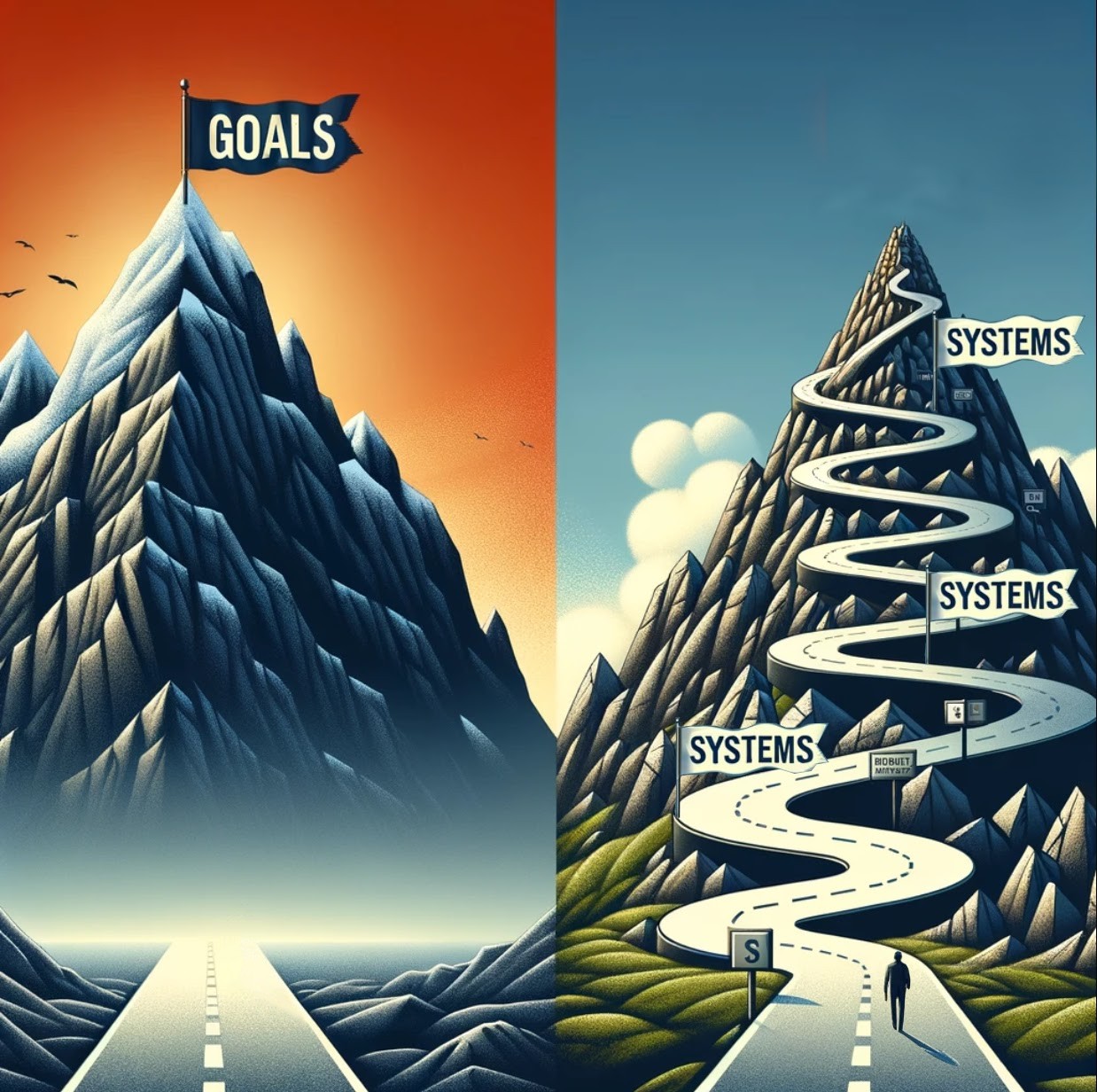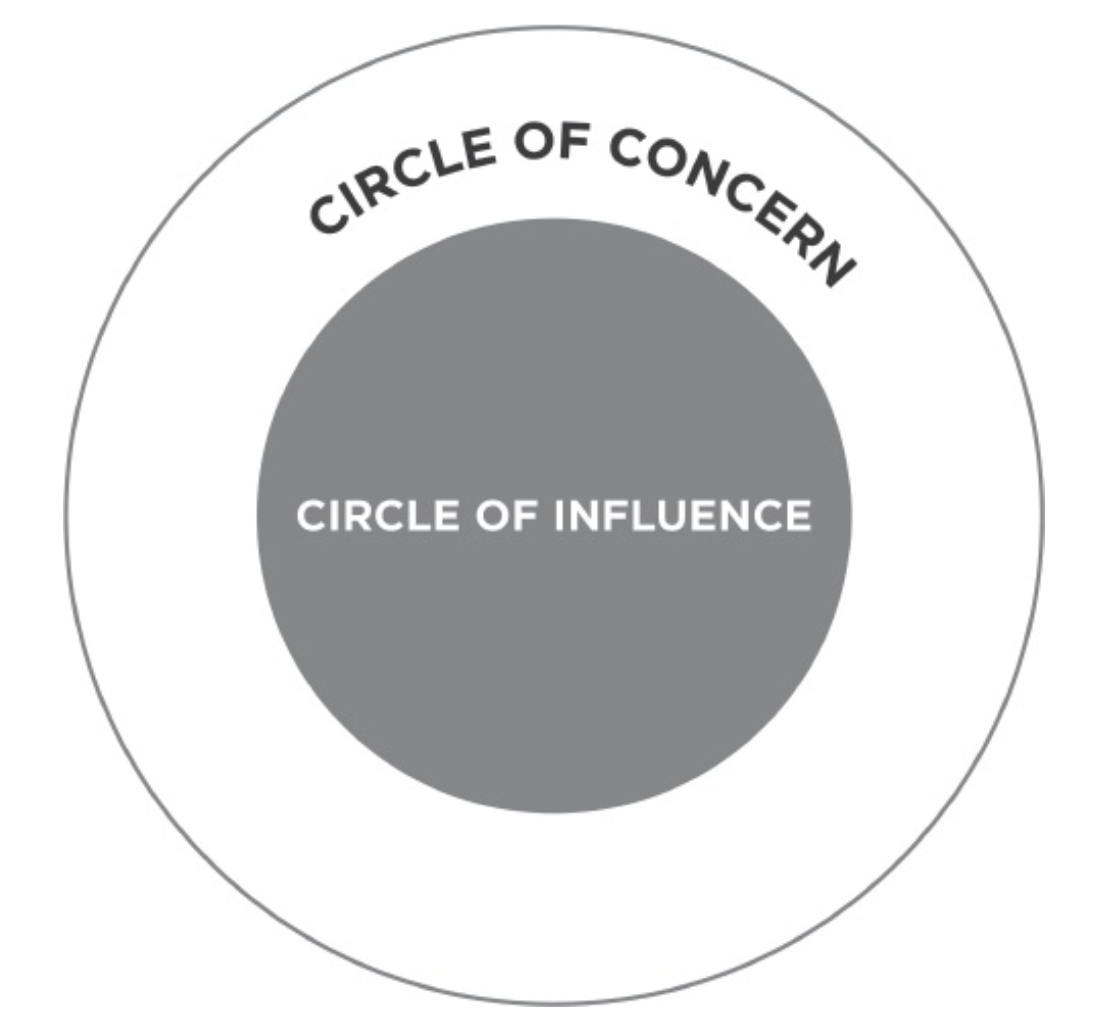Do: Laser Focus on What You Control (AntiWorry)

If we allow ourselves to focus on variables outside of our control, we take the focus from things we can change. Let me repeat. When you think about things outside of your control, you take resources away from things that can make your life better.
You have a finite amount of time and if you focus on that you cannot change, you steal time away from actions that bring change to your life.
IF: You focus on what you cannot change
THEN: you steal time away, from actions that bring change.
As you focus on what you control, your circle-of-influence (what you control), increases. Inversely if you focus on what you cannot change your circle of influence decreases.
Hence, focus on what you can control. Think about what you can control. Laser focus on variables under your control. Focus on your actions, focus on your inputs into this life, and take the outputs to re-evaluate your input actions.
Control The Type of Information You Intake
It becomes easier to focus on things that are under our control when we filter the type of information coming our way. When we limit the information to Important Relevant Actionable Information (IRA Info), most importantly actionable, then our mind tends to gravitate towards thoughts that are also actionable.
On the opposite end of the spectrum if we take in information that is in-actionable, then we are more likely to have negative thoughts with zero action output == worry. Mainstream media is great example of in-actionable often fear focused information, that is likely to use up thought cycles with no positive outcomes (For more refer to Manufacturing Consent). Hence, in typical situations it's best to be ignorant of such information, the important news of the world will reach you through other people.
IRA Info: Important Relevant Actionable


Information must be proportionate to action, particularly habitual consumption of information.
What information consumes is rather obvious: it consumes the attention of its recipients. Hence, a wealth of information creates a poverty of attention and a need to allocate that attention efficiently among the overabundance of information sources that might consume it. — Herbert Simon, recipient of Nobel Memorial Prize in Economics
Wealth of Information --creates--> Poverty of Attention
Most importantly: Information Must be Actionable

Most important part of Tim Ferris's IRA filter is the actionable filter. If the information is not actionable then avoid the consumption of it.
If you are talking to someone and you are interested in receiving the emotions they are giving you, then don't interrupt them. Or you have some other goal in mind that warrants listening to interlocutor then continue.
However, its unproductive to seek out information such as world daily news for the sake of being "Informed". That's just stealing time from learning something that can actually move you forward in life.
Note, it's ok to educate yourself cursorily to not appear ignorant for topics deemed central to society (by gaining very cursory knowledge quickly and stopping consumption). Such cursory knowledge of the world does not require to be up to date with even monthly news.

Quotes
“There are many things of which a wise man might wish to be ignorant” ― Ralph Waldo Emerson
I never watch the news and have bought one single newspaper in the last five years...In five years, I haven’t had a single problem due to this selective ignorance. - Tim-Ferris
For actionable information, I consume a maximum of one-third of one industry magazine (Response magazine) and one business magazine (Inc.) per month, for a grand total of approximately four hours/month. That’s it for results-oriented reading. - Tim-Ferris
Lifestyle design is based on massive action—output. Increased output necessitates decreased input.
Most information is time-consuming, negative, irrelevant to your goals, and outside of your influence.
I challenge you to look at whatever you read or watched today and tell me that it wasn’t at least two of the four. - Tim-Ferris
Develop the habit of asking yourself, “Will I definitely use this information for something immediate and important?” It’s not enough to use information for “something”—it needs to be immediate and important. If “no” on either count, don’t consume it. Information is useless if it is not applied to something important or if you will forget it before you have a chance to apply it. - Tim-Ferris
How to Grasp Specific Information
How to Grasp Specific Information: By Tim Ferris
IF task is "how-to" in nature:
THEN: only read autobiographical accounts of “how I did it”.
No speculators
No wannabes
What if you need to learn to do something your friends haven’t done? Like, say, sell a book to the world’s largest publisher as a first-time author? Funny you should ask. There are two approaches I used:
- I picked one book out of dozens based on reader reviews and the fact that the authors had actually done what I wanted to do. If the task is how-to in nature, I only read accounts that are “how I did it” and autobiographical. No speculators or wannabes are worth the time.
- Using the book to generate intelligent and specific questions, I contacted 10 of the top authors and agents in the world via e-mail and phone, with a response rate of 80%. I only read the sections of the book that were relevant to immediate next steps, which took less than two hours. To develop a template e-mail and call script took approximately four hours, and the actual e-mails and phone calls took less than an hour. This personal contact approach is not only more effective and more efficient than all-you-can-eat info buffets, it also provided me with the major league alliances and mentors necessary to sell this book. Rediscover the power of the forgotten skill called “talking.” It works. Once again, less is more. - Tim-Ferris
Important-Relevant-Actionable Information
Important & Relevant & Actionable (IRA Info) is:

Remember: Do not worry
Remember: If you can do something about a situation, then do not worry about it. Instead, go and enact change. If you cannot do anything, then do not worry about it. Instead, find something that you can change.
Quotes
“The chief task in life is simply this: to identify and separate matters so that I can say clearly to myself which are externals not under my control, and which have to do with the choices I actually control. Where then do I look for good and evil? Not to uncontrollable externals, but within myself to the choices that are my own” - Epictetus
“First understand the do-or-die importance of focus. If you don’t learn to focus, you will have a shallow and unrewarding life without any meaningful achievements. So make it a priority.” — Derek-Sivers
Corollary
Corollary: Do: Cultivate Indifference to What Is Outside Your Control (AntiWorry). To laser focus on what is inside of our control we must cultivate ignorance (ignore) things that our outside of our control.
If you focus on what you control
You train to be in the mindset of doing. The lens you look at the world focuses on things that you can change. And hence your perception of the world becomes that the world (your world) is changing and you see yourself as being able to influence the change.
Focus on your inputs
Before Focus: Establish Direction
Before laser focusing on something: make sure to have Clear Goals.
Focus on your Systems
Goals are about the results you want to achieve.
Systems are about the processes that lead to those results.

Use goals to set direction.
Rely on systems to make progress.
Goals and Systems Simplified
Goals: Your Destination
- Define what you want to achieve.
- Example: "Lose 20 pounds."
Systems: Your Path
- The daily habits that get you to your goal.
- Example: "Daily healthy eating and exercise."
Key Insights:
- Consistency beats intensity: Focus on small, regular actions.
- Enjoy the journey: Process matters more than the end result.
- Be adaptable: Adjust your habits as needed.
- Identity shift: Shift your identity to someone that is aligned with habits that lead to your goal.
Action Steps:
- Break goals into small habits.
- Track your habits.
- Review and adjust regularly.
- Patience is key.
Bottom Line
Goals set the direction; systems ensure progress. Focus on building and maintaining effective systems.

You do not rise to the level of your goals.
You fall to the level of your systems.
The Power of Systems Over Goals
The Essence of the Principle
- Goals: The targets we aim to hit.
- Example: "Win a marathon."
- Systems: The day-to-day behaviors and routines that define our progress.
- Example: "Consistent training schedule and nutrition plan."
Core Insights:
- Achievement mirrors your systems, not your ambitions: Success is less about the goals you set and more about the systems you follow.
- Build robust systems for inevitable success: The strength of your daily practices determines your level of achievement.
- Focus on what you can control: Concentrate on your actions and behaviors, which are within your control, rather than on outcomes, which often aren't.
- Adaptability within systems leads to growth: Systems that allow for feedback and adjustment are more effective in reaching long-term success.
Developing Strong Systems:
- Map out daily and weekly routines that align with your ultimate objectives.
- Implement consistent habits that are directly linked to your areas of focus.
- Regularly review and refine your systems based on outcomes and new insights.
- Embrace an identity that reflects the processes of your systems.
The Fundamental Truth
Your level of success is a reflection of the systems you implement and maintain, not the height of your goals. By focusing on building effective systems, you ensure continuous progress and long-term achievement.
If successful and unsuccessful people share the same goals, then the goal cannot be what differentiates the winners from the losers.
Problems arise when you spend too much time thinking about your goals and not enough time designing your systems.
Problem #1: Winners and losers have the same goals.
Goal setting suffers from a serious case of survivorship bias. We concentrate on the people who end up winning—the survivors—and mistakenly assume that ambitious goals led to their success while overlooking all of the people who had the same objective but didn’t succeed.
Every Olympian wants to win a gold medal. Every candidate wants to get the job. And if successful and unsuccessful people share the same goals, then the goal cannot be what differentiates the winners from the losers. It wasn’t the goal of winning the Tour de France that propelled the British cyclists to the top of the sport. Presumably, they had wanted to win the race every year before—just like every other professional team. The goal had always been there. It was only when they implemented a system of continuous small improvements that they achieved a different outcome.
Problem #2: Achieving a goal is only a momentary change.
Imagine you have a messy room and you set a goal to clean it. If you summon the energy to tidy up, then you will have a clean room—for now. But if you maintain the same sloppy, pack-rat habits that led to a messy room in the first place, soon you’ll be looking at a new pile of clutter and hoping for another burst of motivation. You’re left chasing the same outcome because you never changed the system behind it. You treated a symptom without addressing the cause.
Achieving a goal only changes your life for the moment. That’s the counterintuitive thing about improvement. We think we need to change our results, but the results are not the problem. What we really need to change are the systems that cause those results. When you solve problems at the results level, you only solve them temporarily. In order to improve for good, you need to solve problems at the systems level. Fix the inputs and the outputs will fix themselves.
Problem #3: Goals restrict your happiness. (Happiness is in the future).
The implicit assumption behind any goal is this: “Once I reach my goal, then I’ll be happy.” The problem with a goals-first mentality is that you’re continually putting happiness off until the next milestone. I’ve slipped into this trap so many times I’ve lost count. For years, happiness was always something for my future self to enjoy. I promised myself that once I gained twenty pounds of muscle or after my business was featured in the New York Times, then I could finally relax. Furthermore, goals create an “either-or” conflict: either you achieve your goal and are successful or you fail and you are a disappointment. You mentally box yourself into a narrow version of happiness. This is misguided. It is unlikely that your actual path through life will match the exact journey you had in mind when you set out. It makes no sense to restrict your satisfaction to one scenario when there are many paths to success.
A systems-first mentality provides the antidote. When you fall in love with the process rather than the product, you don’t have to wait to give yourself permission to be happy. You can be satisfied anytime your system is running. And a system can be successful in many different forms, not just the one you first envision.
Problem #4: Goals are at odds with long-term progress.
Finally, a goal-oriented mind-set can create a “yo-yo” effect. Many runners work hard for months, but as soon as they cross the finish line, they stop training. The race is no longer there to motivate them. When all of your hard work is focused on a particular goal, what is left to push you forward after you achieve it? This is why many people find themselves reverting to their old habits after accomplishing a goal.
The purpose of setting goals is to win the game. The purpose of building systems is to continue playing the game. True long-term thinking is goal-less thinking. It’s not about any single accomplishment. It is about the cycle of endless refinement and continuous improvement. Ultimately, it is your commitment to the process that will determine your progress.
Related
Focus on your circle of influence
Proactive people focus their efforts in the Circle of Influence. They work on the things they can do something about. The nature of their energy is positive, enlarging and magnifying, causing their Circle of Influence to increase.

Anytime we think the problem is “out there,” that thought is the problem. We empower what’s out there to control us. The change paradigm is “outside-in”—what’s out there has to change before we can change.
Related Quotes
“The ignorant man’s position and character is this: he never looks to himself for benefit or harm, but to the world outside him. The philosopher’s position and character is that he always look to himself for benefit and harm.” — Epictetus, Enchiridion
God grant me the serenity to accept the things I cannot change, courage to change the things I can change; and wisdom to know the difference. - Serenity Prayer
Related
Related Thoughts
Imagine you're dealing with someone who's hoarding. Now, people who are hoarding are often older, or neurologically damaged, or have obsessive-compulsive disorder. Then, you walk into their house and find around 10,000 items. There are maybe a hundred boxes. You open a box, and inside, there's a mix of pens, old passports, checks, a collection of silver dollars, some hypodermic needles, dust, and even a dead mouse. The house is filled with boxes like that—absolute chaos. Not order. Chaos.
You might wonder, is that their house? Or Is that their being? Is that their mind? The answer is: there's no difference. So, if you want to organize your psyche, you could start by organizing your room. This might be easier, especially if you're a more concrete person and need something concrete to begin with.
So you go clean up under your bed and you make your bed and you organize the papers on your desk. And you think well just exactly what are you organizing? Are you organizing the objective world, or are you organizing your field of being—your field of total experience? Jung believed that, and I think there's a Buddhist doctrine nested in there, that at the highest level of psychological integration, there's no difference between you and what you experience.
Now, you might think, "Well, I can't control everything I experience," but that's no objection because you can't control yourself entirely anyway. So, the mere fact that you can't extend control over everything you experience is no argument against the idea that you should still treat that as an extension of yourself.- Jordan-Peterson/video: reference

[people reach out about] How starting to clean up their room changed their life is quite fun because it's something I always tell people to do instead of going out and protesting. If you want to change the world, you start from yourself and work outward because you build your competence that way. It's like, I don't know how you can go out and protest the structure of the entire economic system if you can't keep your room organized.- Jordan-Peterson/video ref
Metadata
Related
Warren Buffet and Bill Gates picked the same word that account for their success: Focus - (ref)
Children
Backlinks
- Self Code Guidance
- Highlighted Notes
- Issues with External Praise
- How to Establish Clear Goals
- Concerned
- Do: Cultivate Indifference to What Is Outside Your Control (AntiWorry)
- Dont worry/Anti Worry Mindset
- Rule 8
- Current-Events
- Focus on Circle of Influence
- Stoicism
- Time Box Nice to Haves
- Laser Focus on the Task at Hand